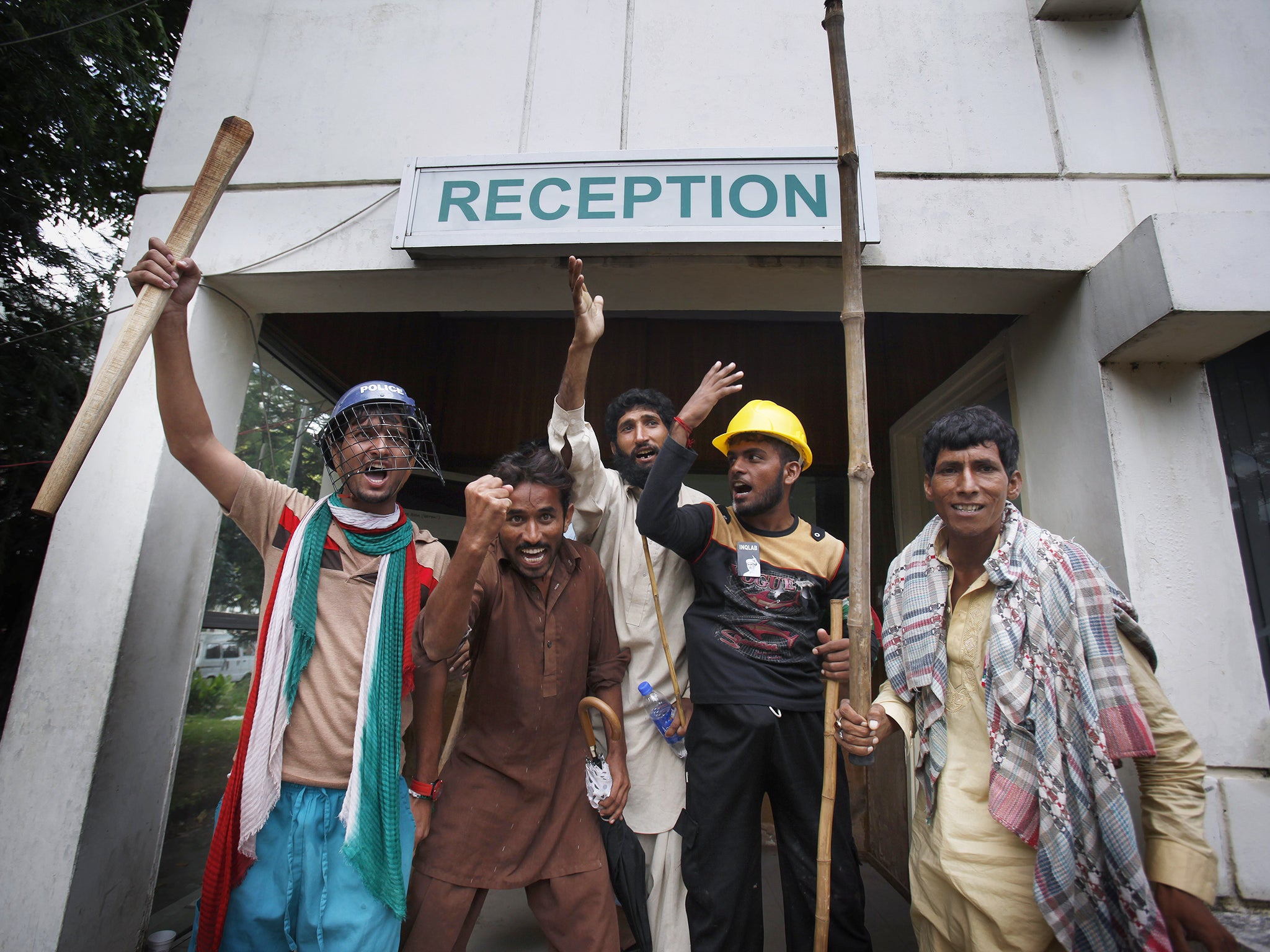Pakistan protests turn deadly as TV station stormed by demonstrators
Tens of thousands of protesters have besieged capital Islamabad

Pakistan's capital was plunged into further chaos after anti-government protesters pushed ever closer to the Prime Minister’s residence and stormed the offices of a state-controlled television channel.
Pakistan Television (PTV) was forced off the air after demonstrators pushed their way into the building. Some reports said equipment was damaged but the protesters denied anything had been broken or that anyone had been hurt.
Shortly afterwards, other television channels showed troops and paramilitary soldiers entering the building and making the protesters leave. They later established a security cordon around the building in the centre of Islamabad.
“They have stormed the PTV office,” one news anchor said, just before the screen went blank, according to the Reuters news agency. “PTV staff performing their journalistic duties are being beaten up.”
In pictures: Pakistan protesters clash with police in Islamabad
Show all 10The latest drama came after a weekend of clashes between anti-government protesters and security forces that left three people dead and around 200 requiring medical treatment. On Saturday night, police had used tear gas to repel the demonstrators after they tried to march on the residence of Prime Minister Nawaz Sharif.
The 20,000 or so demonstrators who have besieged Islamabad are part of two different protest groups. One is led by cricketer-turned-politician Imran Khan, who has claimed last year’s election, which Mr Sharif won handsomely, was rigged. The other group is lead by a Muslim cleric who usually lives in Canada, Tahir ul-Qadri, who also claims Mr Sharif is corrupt.
Both groups have said they will not leave until the government stands down and have urged their supporters at their protest camps to stand firm.
Mr Sharif was elected to his third term as Prime Minister in an general election held in May 2013, with Mr Khan’s Pakistan Tehreek-e-Insaf (PTI) party coming second in many major cities. Mr Khan accepted the results of the election but called for a probe into alleged vote rigging.
He launched his so-called freedom protest after claiming the government and the election commission had failed to follow up on its agreement to launch an inquiry.
While Mr Sharif has agreed to many of the demands of the protesters he has rejected their call for him to stand down. On Tuesday, he is due to address the two houses of parliament, presumably in an attempt to show that he remains in control.
As is often the case in Pakistan, one pulsating uncertainty is what the powerful military may or may not do. On Sunday evening, the army chief summoned his senior commanders for a crisis meeting to discuss the deteriorating security situation in the capital.
In a statement released afterwards, the military said that while it reaffirmed its support for democracy it considered with “serious concern” the violent turn the protests had taken.
“It was once again reiterated that the situation should be resolved politically without wasting any time and without recourse to violent means,” the statement said. “[The] army remains committed to playing its part in ensuring the security of the state and will never fall short of meeting national aspirations.”
Many have suggested that the protesters may be receiving the support of the military. Both Mr Khan and Mr Qadri have denied such claims.
What is certainly not doubted is that Mr Sharif has long had a difficult and testy relationship with the country’s armed forces. He was forced from office in 1999 by a military coup led by Pervez Musharraf, the then army chief.
Since his election victory 16 months ago, Mr Sharif’s relationship with the army establishment has not been improved by his decision to allow the prosecution of Mr Musharraf – charged with treason – to proceed.
Subscribe to Independent Premium to bookmark this article
Want to bookmark your favourite articles and stories to read or reference later? Start your Independent Premium subscription today.

Join our commenting forum
Join thought-provoking conversations, follow other Independent readers and see their replies